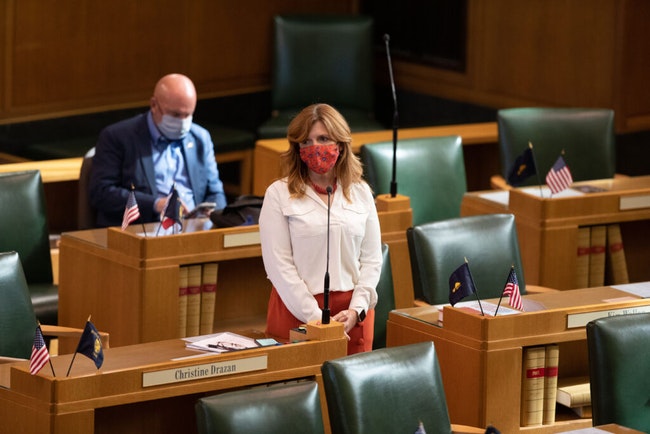
State Rep. Christine Drazan, R-Canby, speaks during a legislative special session on Monday, Sept. 20, 2021. (Amanda Loman/Oregon Capital Chronicle)
SALEM – House Minority Leader Christine Drazan plans to run for governor, becoming the highest-profile Republican official to enter an increasingly crowded race.
Drazan, a two-term state representative from Canby, plans to officially launch her campaign before the end of the year. In a statement shared with the Oregon Capital Chronicle, she said friends and supporters have encouraged her to run for governor over the past few months.
“Through these conversations, it has become clear that Oregonians are ready for change,” Drazan said in the statement. “They are tired of the backroom deals, the broken promises and the failed leadership. They are tired of our state consistently being in the national headlines for all the wrong reasons. Frankly, I am too.”
Drazan will join a GOP primary field that thus far lacks a clear front-runner and any candidates with elected experience beyond the city level. She declined an interview Tuesday to talk more about the race.
Sandy Mayor Stan Pulliam leads the GOP field in fundraising, with about $527,000 raised this year. Bridget Barton, a political consultant from Lake Oswego, has raised $378,000. Salem oncologist Bud Pierce reported raising $750,000 for his campaign, but nearly half that sum came from his own bank account.
Drazan has about $150,000 left in a campaign finance committee from her 2020 campaign for the House.
She quickly rose to prominence in her caucus and was elected minority leader in the fall of 2019, after just nine months in office. Drazan’s political work stretches back to the ’90s, when she worked as chief of staff for Republican House Speaker Mark Simmons. She also worked as a political coordinator for the Oregon Restaurant and Lodging Association, one of the state’s most powerful business lobbies, and executive director of the Cultural Advocacy Coalition before running for office.
In 2020, Drazan led her caucus on a trip out of state to deny House Democrats the quorum they needed to pass legislation aimed at reducing carbon emissions. This year, she struck a deal with House Speaker Tina Kotek, who is also running for governor, to avoid Republican walkouts in exchange for an equal voice in drawing new legislative and congressional districts.
That deal fell apart days before the deadline to approve new districts, and Drazan sought to have Kotek formally censured by the House for breaking her word.
A Republican hasn’t served as governor since Vic Atiyeh ended his second term in 1987. However, Republicans have more reason to hope in 2022 than they’ve had in years, thanks to GOP victory in the Virginia governor’s race, a closer-than-expected governor’s race in New Jersey and Democratic Gov. Kate Brown’s lack of popularity, combined with a historic trend of the president’s party performing worse in midterm elections.
Drazan, like Virginia governor-elect Glenn Youngkin, has largely avoided getting involved in some of the Trumpian politics that still grip the national Republican Party. After the Oregon Republican Party referred to the attempted insurrection on Jan. 6 as a “false flag” operation, Drazan got her caucus to release a unanimous statement condemning the state party.
She also called on then-Rep. Mike Nearman, R-Independence, to resign after seeing video of him coaching right-wing demonstrators on how to enter the locked Capitol during a special session on Covid policy.
Kotek, state Treasurer Tobias Read and former New York Times columnist Nick Kristof lead the Democratic primary, while a pack of lesser-known candidates led by Yamhill County Commissioner Casey Kulla have spent months focused on building support from grassroots candidates.
Nominees from both parties will likely face an additional challenge from state Sen. Betsy Johnson, a longtime moderate Democrat from Scappoose who relinquished her party affiliation to run for governor. Johnson raised more than $2 million, mostly from longtime Oregon businesses, during the first month of her campaign, and could draw support from both the left and the right.
Oregon Capital Chronicle is part of States Newsroom, a network of news bureaus supported by grants and a coalition of donors as a 501c(3) public charity. Oregon Capital Chronicle maintains editorial independence. Contact Editor Les Zaitz for questions: [email protected]. Follow Oregon Capital Chronicle on Facebook and Twitter.
NEWS TIP? Please send an email to [email protected] for our reporters to consider.




